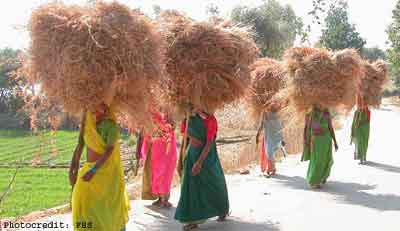A platform to share experiences and knowledge on the availability and requirement of fodder, feed and grazing areas
Nov 05, 2009
Rainfed Livestock Network (RLN) together with Foundation for Ecological Security (FES) organised a workshop entitled, “Fodder, feed and grazing issues of Livestock Keepers with specific reference to CPRs”, from 8-9th October 2009 at New Delhi.
The focus of the workshop was on synthesizing lessons from the case studies/programmes undertaken by different organizations across arid and semi-arid areas with the hypothesis that this would help in identifying the policy gaps and evolving policy framework for poor livestock keepers.
The objective of the workshop was to share experiences and knowledge on the availability and requirement of fodder, feed and grazing areas, the changes over the period of time and their impact on poor livestock keepers and natural resources. It also aimed at synthesizing experiences of programmes such as watershed development, Joint Forest Management and silvipasture system on the livestock as livelihood support for poor livestock keepers. Translating these learnings into a framework for CPR-livestock policies that will protect interest of poor livestock keepers was the ultimate aim of the deliberations and sharing of experiences at the workshop.
There was ample representation from all fields including Government Institutions- Research agencies like Central Arid Zone Research Institute; Central Sheep and Wool Research Institute and Indian Grassland and Fodder Research Institute (IGFRI) and NGOs like ANTHRA, WOTR, FES, WASSAN and Seva Mandir. All the presentations expressed concerns and issues especially on CPR degradation, fodder and feed inadequacies and the manner in which livestock keepers interests have been marginalized. Issues were also raised on policies for redistributing CPRs, regulations for use of fodder, conflicts resolution, pastoralists grazing rights and measures undertaken by Research organizations in rangeland and forage development. Since Pastoralism is not static and moves from one economical niche to the other, it led to an interesting discussion on the issues of pastoralism and CPRs.
 It was concluded that the issue of fodder deficit can be addressed through increasing productivity and greater diversity. The forum agreed that the Interventions in agriculture should address fodder issues through promoting cultivated fodder. Post kharif, fodder production can be taken up on private land areas with more palatable fodder species to contribute to fodder security.
It was concluded that the issue of fodder deficit can be addressed through increasing productivity and greater diversity. The forum agreed that the Interventions in agriculture should address fodder issues through promoting cultivated fodder. Post kharif, fodder production can be taken up on private land areas with more palatable fodder species to contribute to fodder security.
Good Practices on CPRs - livestock published under the aegis of South Asia Pro-Poor Livestock Policy Programme were among the concrete cases showing Commons managed by the livestock dependent poor communities. The forum agreed that the cases presented in the GP Notes (SAGP02, SAGP13, INGP31, INGP28, INGP33) have the potential of getting translated into policies to protect interest of poor livestock keepers
Based on the discussion in the workshop, various recommendations mentioned below were agreed upon to lay down the future course of action.
- A strong macro economic justification will be needed to invest in grazing areas showing benefits of CPRs which will further benefit the society at large. This shall include process design, investment and institutional mechanism.
- The programme can be taken up to National level in the Planning Commission where various sub committees on fodder, extension and value addition are already functional.
- At least 10% of land should be under fodder cultivation especially pulses.
- Seed production programme should be strengthened creating marketing channels.
- Rotational grazing system will be useful for natural recovery and reseeding benefits.
- Cases for investment from present studies should reflect potential contribution to livelihood, sociological dimensions, land use, legal and institutional aspects.
Contributed by - BAIF, India









